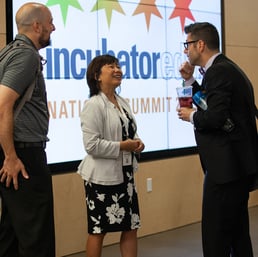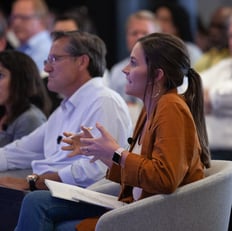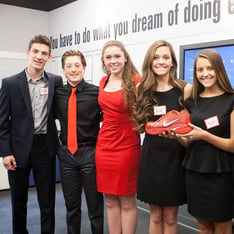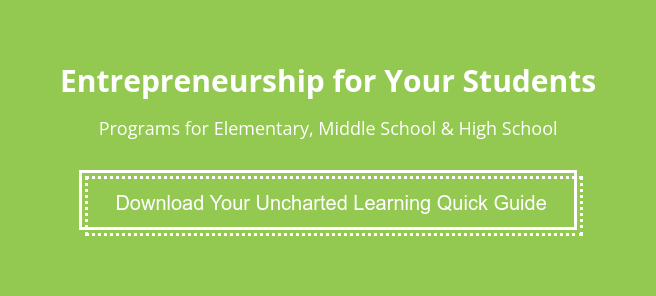 The value of entrepreneurship is talked about a lot in education circles as an instructional theme to support skill building. But really, what are the benefits?
The value of entrepreneurship is talked about a lot in education circles as an instructional theme to support skill building. But really, what are the benefits?
Well, here’s one:
The power of learning to fail and recover. This is inherent to being an entrepreneur, and a great lesson for life, regardless of a student's post-graduation path, not just business. Entrepreneurship offers skills needed more than ever as we all grapple with the 'new normal' that is upon us.
To bring the power of 'learning to fail' to life, here are excerpts from three recent talks we've taken part in. Each interviewee provides a distinctive and credible perspective: A young entrepreneur and student alum of INCubatoredu, a Superintendent of a leading school district in Austin, and a former executive and innovator from a leading global company, who dedicates his time mentoring students.Here's what they had to say about about the education theme of 'failure':
'I Love to Fail'
 Kat Mena is an INCubatoredu alum, student entrepreneur, and is now working in innovation and strategy at a healthcare company.
Kat Mena is an INCubatoredu alum, student entrepreneur, and is now working in innovation and strategy at a healthcare company.
Interviewer: So, what have your entrepreneurship experiences meant to you...?
Kat: I was planning on med school, but then I took INCubatoredu, an entrepreneurship class in high school, and I loved it. I loved how I could understand every single aspect of a business. At college, I immediately got involved in Redhawk Ventures (my University's student-led venture capital fund), I also interned at a venture fund in Chicago for two summers, I spent a semester in San Francisco working at a startup and … everything is because of INCubatoredu...
'What's really cool about INCubatoredu is it gives you a holistic understanding of a business model so you're not really just siloed into marketing, you're not siloed into product development or finance, it's like you get to touch everything.'
Interviewer: Kat, I've got to say it looks like everything worked out just as you planned, is that the reality?
Kat: It's not... it's not like that. In high school my INCubatoredu team was  awarded a large investment (at Pitch night). Soon after, we realized our design wasn't patentable. So, what we originally were going to use our funds for had to be repurposed. We were able to work with a product development firm and learn how to brainstorm and ideate which was really cool and it's a skill that I used throughout my college career.
awarded a large investment (at Pitch night). Soon after, we realized our design wasn't patentable. So, what we originally were going to use our funds for had to be repurposed. We were able to work with a product development firm and learn how to brainstorm and ideate which was really cool and it's a skill that I used throughout my college career.
You start seeing how you learn from that failure and how much it benefited us in the long term. I love to fail and I don't really have a problem with it anymore because you learn something you wouldn't have known had you succeeded.
'I look at failure more so as an opportunity, not as a personal shortcoming.'
It's really, you know 'okay, this door closed, there's a better one out there', so you just keep pivoting until you find the one that's open…And, it's really important not to stay down because maybe it wasn't the right move for you at that time, and there was a better move coming your way.
'You Want Your Kids to Fail. Period.'
.jpg?width=178&name=tom%20(2).jpg) Dr. Tom Leonard is the Superintendent of Eanes Independent School District in Austin, Texas, and is a champion of student entrepreneurship.
Dr. Tom Leonard is the Superintendent of Eanes Independent School District in Austin, Texas, and is a champion of student entrepreneurship.
Interviewer: So what is fail forward? What does that mean?
Dr. Leonard: Typically in schools in the academic domain, we don't want kids to fail. I stand up in front of parents all the time, and I'll look them in the eyes and say, 'You want your kids to fail. Period. You want your kids to fail, and you want them to do it in a safe place, because they are going to fail in life'. And I remind parents, 'Every one of you failed in life. It was either a relationship, it was a job, it was a project...everyone fails'. And what high school entrepreneurship and (INCubatoredu) does well is it teaches, 'what do you do when you fail?'
INCubatoredu students work with the Lean Start-up model... you start your idea, you work it one way, you have a Board or an advisor look at it, and they kindly tear you apart, and you may fail. And then, you have at it again, and get another notch up, and then they tear you down and you fail. And then you pivot. And you do that about 27 times and hopefully at the end, you've got something that's decent.
Resiliency Through Failure
Interviewer: Why is this process so beneficial?
Dr. Leonard: Kids need to experience that. That is, in my mind, that's what helps build resiliency. And resiliency is critical for survival. Parents understand and support that. And the kids get it. And whether they go into business or not, it doesn't matter. What they can learn in this process can help them if they get into a challenging situation. They're going to have to pivot. They go back and look at their assumptions, figure out where they can get better, and try again.
'Kids need to experience that. That is, in my mind, what helps build resiliency. And resiliency is critical for survival.'
Two Questions...
 Kevin Newell is President of KL Newell Consulting, former McDonald's Corp. President of the West Zone & Global Chief Brand Officer, and student mentor at Michele Clark Academic Prep High School in Chicago Public Schools
Kevin Newell is President of KL Newell Consulting, former McDonald's Corp. President of the West Zone & Global Chief Brand Officer, and student mentor at Michele Clark Academic Prep High School in Chicago Public Schools
Interviewer: What is your take on 'Fail Forward'?
Mr. Newell: I ask two questions when mentoring students while we're working on a project. It they hit a wall, or something doesn't work, if they feel failure; I ask the same two questions that I asked my team when I was working at McDonald's: 'What did you learn? And, what are you going to do differently?'
These two questions encourage them to think about the missteps they made, or steps that they should have taken, or that they didn't take. And they just go back...there's nothing wrong with going back and reworking, we do it all the time. We do it in life, in school, in one's professional life. So, just those two questions, 'what did you learn? And, what are you going to do differently based on that?'
'...there's nothing wrong with going back and reworking, we do it all the time. We do it in life, in school, in your professional life.'
Processing and Learning from Failure
INCubatoredu curriculum embodies this theme, and early on in the course, students are guided to switch up what they've learned to date about failure, and very quickly are experiencing little failures - and learning and pivots - that result in a new skill that will make them more resilient, agile and confident as they embark on 'what's next'.
Here’s a quick worksheet for students around this topic of learning to fail — great for remote or in-person learning.
